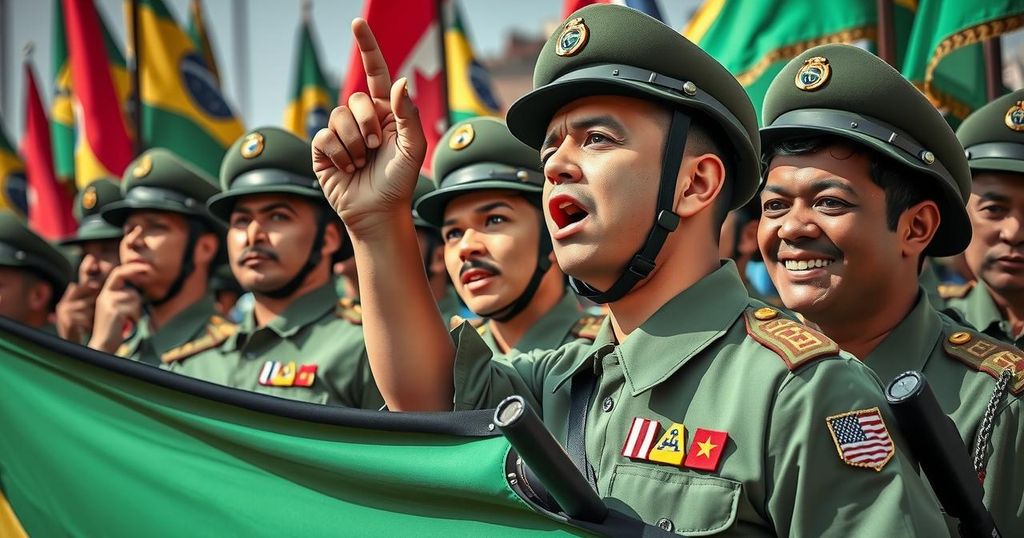The Workers Party commemorated the second anniversary of the coup attempt on January 8, 2023, with President Lula attempting to align with military officials while downplaying serious accusations of their involvement in the coup plot. His rhetoric framed traditional democracy as superior while disparaging historical revolutions, reflecting a lack of alignment with the Brazilian working class. This situation is compounded by renewed right-wing political influences, signaling a concerning future for Brazil’s democratic integrity.
On January 8, 2023, Brazil marked the second anniversary of the attempted coup led by former President Jair Bolsonaro and segments of the military. Since the last anniversary, significant revelations regarding the extent of military involvement in the coup plot have surfaced, challenging the narrative previously held by the Workers Party (PT) government. In response to these recent developments, the PT organized a ceremony that, unlike the previous year’s “Democracia Inabalada” event, was characterized by a deeper reactionary tone and a lack of forthrightness.
During the ceremony, President Luiz Inácio Lula da Silva welcomed high-ranking Armed Forces commanders, who reportedly displayed discomfort throughout the event. Lula attempted to present a nationalist appeal by claiming that the military should prioritize national sovereignty. Critics argue that this move distracts from Brazil’s significant social tensions, paralleling rhetoric used during the 1964 military coup that suppressed opposition forces. Moreover, Lula’s alignment with the military—an institution implicated in the coup—signifies an effort to alleviate the acute political crisis currently facing Brazil.
Further complicating matters, Lula immediately downplayed the serious implications of military discussions regarding the coup, labeling those involved as “a bunch of irresponsible people, I would say, a bunch of lunatics.” This dismissal does not align with recent arrests of former officials connected to assassination plots against Lula and other leaders. Supreme Court Justice Alexandre de Moraes echoed similar sentiments, erroneously attributing the coup attempt’s roots to unregulated freedom of speech online.
In a notable section of his speech, Lula framed traditional bourgeois democracy as superior while attacking the legacies of social revolutions, specifically the October Revolution of 1917 in Russia and the Cuban Revolution, falsely suggesting the absence of workers’ representation in both events. Lula’s characterization of these revolutions is seen as a deliberate distortion that undermines the historical contributions of the working class in achieving democratic processes. He also failed to reference any significant achievements beyond his own political ascension, highlighting a disconnect from the broader struggles of Brazilian labor.
The speech and commemorative event drew minimal public attention, mainly attracting state bureaucrats rather than a wider audience. Lula’s remarks concerning historical revolutions exhibited profound contradictions, as he neglected to acknowledge any comprehensive representation of the Brazilian working class in contemporary governance. Additionally, the resurgence of right-wing politics, exemplified by Bolsonaro’s ties to Donald Trump, further complicates Brazil’s political landscape as diplomatic and internal tensions continue to escalate.
In conclusion, the PT’s response to the anniversary of the coup reflects an ongoing effort to reshape the narrative surrounding democratic governance in Brazil, often at the expense of important historical legacies and truths. The PT’s collaboration with military forces amidst rising social and political tensions poses a significant challenge, potentially paving the way for future unrest. As the danger of resurgent fascism mounts, an urgent call for a renewed focus on the empowerment of the working class is critical to counteracting these ongoing threats.
Lula’s rhetoric, focusing solely on a bourgeois democratic framework while demonizing past revolutions, fails to address the complexities of Brazil’s socio-political challenges. The ultimate resolution requires a concerted effort towards an international socialist revolution, which remains the most viable path for ensuring true democratic representation and protection against imperialist forces that threaten Brazil’s sovereignty and working-class interests.
The Workers Party (PT) in Brazil finds itself at a pivotal moment as it commemorates the second anniversary of the January 8 coup attempt, which sought to overthrow the democratic government led by President Luiz Inácio Lula da Silva. This event reflects the ongoing tensions between Brazil’s military establishment and the current political landscape, which is marred by allegations of conspiracy and undemocratic practices. Historical context, including military coups and the legacy of authoritarian rule in Brazil, drives contemporary debates around democracy, nationalism, and the role of the military; all of which are critically examined in the wake of Lula’s recent public statements and the broader societal implications.
In conclusion, the second anniversary of the coup attempt exposes significant inconsistencies within the Workers Party’s approach to the military and the broader narrative surrounding democracy in Brazil. Lula’s attempts to ally with military leaders, alongside misleading characterizations of historical social revolutions, illustrate a disconnect from the evolving needs and struggles of the working class. As tensions rise, especially in light of external pressures from both domestic right-wing factions and international imperial interests, it is crucial to embrace a comprehensive strategy that emphasizes the empowerment of the working class and the necessity for a genuine socialist revolution.
Original Source: www.wsws.org






